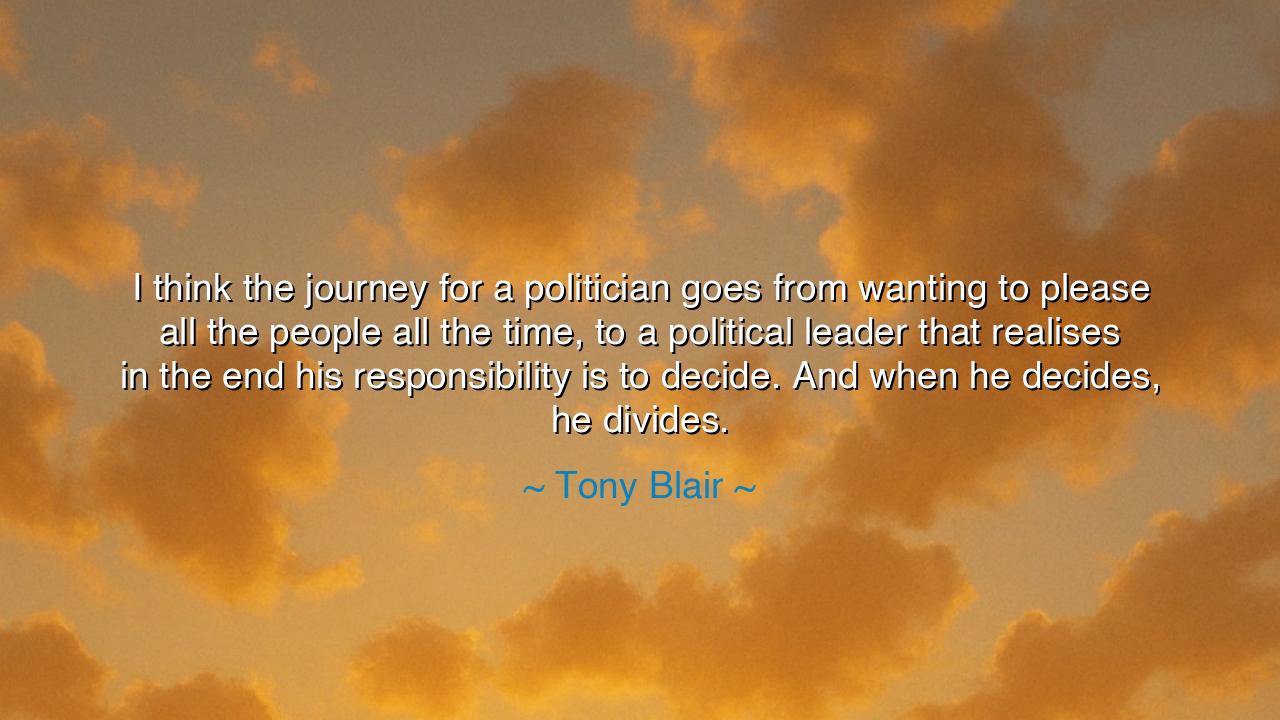
I think the journey for a politician goes from wanting to please
I think the journey for a politician goes from wanting to please all the people all the time, to a political leader that realises in the end his responsibility is to decide. And when he decides, he divides.






The words of Tony Blair strike at the heart of governance: “I think the journey for a politician goes from wanting to please all the people all the time, to a political leader that realises in the end his responsibility is to decide. And when he decides, he divides.” In this reflection lies the eternal truth of leadership—that it is not merely a path of applause and approval, but a burden of choice, where each decision carries with it the power to heal some and to wound others. To lead is not to charm the crowd, but to carry the weight of destiny upon one’s shoulders.
In the beginning, the politician seeks favor. He longs for the smile of the people, for the cheer of the masses, for harmony without conflict. Yet, as Blair reminds us, this is but the early stage of the journey. True leadership demands more. It demands that a man set aside his hunger for universal approval and instead embrace the lonely courage of decision. For every decision draws a line: one side uplifted, the other disappointed. To decide is to divide, and only those willing to bear that wound of division are worthy to be called leaders.
History bears witness to this truth. Consider Abraham Lincoln, who, in the crucible of the American Civil War, faced a nation torn apart. At first, many urged compromise, pleading for policies that would offend no one too greatly. But Lincoln knew that indecision would only prolong the agony. When he signed the Emancipation Proclamation, he divided the nation irrevocably—freeing the enslaved, angering the slaveholders, and sealing his fate as a target of hatred. Yet by deciding, he also laid the foundation for a new birth of freedom. In him we see the truth of Blair’s words: the leader who dares to decide must also accept the rift that decision brings.
There is a heroism in such decision-making, for it requires sacrifice of self. The leader must set aside the longing for universal love and accept instead the possibility of scorn. This is the crucible of greatness: to stand firm in the storm of criticism, anchored not by popularity, but by conviction. Such a path is lonely, yet it is the only path that leads to transformation. For if a leader fears division so greatly that he avoids decision, then he becomes not a leader, but a shadow.
The deeper meaning of Blair’s teaching lies also in its wisdom for life beyond politics. Every man and woman, in their own sphere, must sometimes choose between pleasing everyone and doing what is right. The parent who disciplines a child, the teacher who sets a high standard, the friend who speaks an uncomfortable truth—all take upon themselves the burden of division for the sake of growth and justice. Thus, Blair’s insight is not only political but universal, reminding us that leadership, in any form, requires the courage to endure conflict for the sake of a greater good.
To the seekers of wisdom, let this be a guide: do not measure the strength of a decision by how many applaud it, but by how deeply it aligns with truth, justice, and necessity. If your choice offends some, ask not whether you are loved, but whether you are right. For popularity is fleeting, but integrity endures. The leader’s task is not to echo the voices of the crowd, but to lift them toward a higher vision, even when they resist.
The practical teaching is this: when faced with choices in your own life, dare to decide. Do not shrink from the possibility of division, for indecision is itself a choice that often breeds more suffering than a firm stand. Ask yourself what principles guide you, and let them be the compass of your action. If others disagree, accept it with grace, for division is the price of truth. Stand firm, speak clear, and act boldly, for in so doing, you fulfill not only your responsibility but your humanity.
Thus, let Blair’s words be remembered: to decide is to divide, yet to decide is also to lead. Only the one who accepts this burden can shape the course of nations—or the destiny of their own soul. And so, let the teaching be carried forward: seek not to please all, but to be faithful to truth. For in the end, history honors not those who avoided conflict, but those who bore it with courage and transformed the world.






AAdministratorAdministrator
Welcome, honored guests. Please leave a comment, we will respond soon